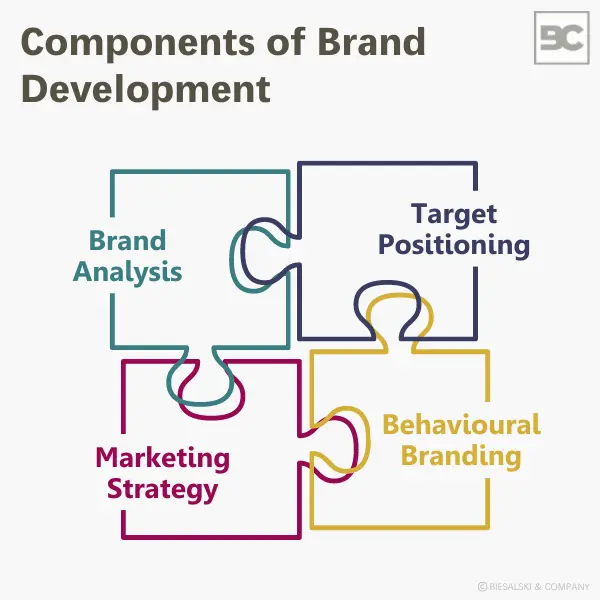Brand development
What is Brand Development?
Brand development refers to the process within a company required to successfully (further) develop a brand and establish it positively with customers in the long term.
While traditional brand building focuses on positioning a new brand in the market, brand development is centred on optimising or realigning existing brands.
What is involved in Brand Development?
The following key components of brand development ensure that a brand evolves in a targeted manner and remains successful in the market over the long term:

- Brand Analysis
A thorough assessment of current brand awareness, brand perception, and brand preference—also in comparison to competitors—is essential. A target group survey serves as the foundation, providing a deep understanding of the needs of (potential) customers. This analysis offers concrete recommendations for action, forming the basis for all further decisions in brand development. Regular target group surveys and market analyses allow brands to tailor their messages and offerings precisely to customer needs.
Target Positioning
Brand development requires a medium- to long-term review of the brand’s target positioning in the market. Has the business model changed in recent years? Do the core benefits still hold? How has the brand’s personality evolved? The goal is to position the brand in a way that it evokes the desired emotions and associations within the target group, ensuring its desirability remains intact. It is important to strike a balance between consistency in brand communication and the ability to adapt to changing market conditions and trends without constantly altering or diluting the brand’s core values.Marketing Strategy
An integral part of brand development is the adjustment of the marketing strategy. This involves selecting the appropriate measures and channels to communicate the brand effectively and expand its reach.Behavioural Branding
Employees are important brand ambassadors. Successful brand development must therefore also be embraced internally. Training and a strong corporate culture are essential to authentically represent the brand externally.
What Approaches exist for Brand Development?
Brand development and management strategies can be categorised into competition-oriented, impact-driven, and identity-based approaches, each reflecting the marketing philosophy of the time. Since the mid-1990s, brands have predominantly been developed and managed based on identity. Factors driving this shift include the increasing similarity of products and services, the explosion of available information, the rapid digitalisation of communication, and the dramatic rise in the number of brands being introduced globally.
Contact
For an informal discussion about brand development, feel free to contact brand expert Alexander Biesalski at +49 89 273 73 54 01 or via email at biesalski@biesalski-company.com.
More information on Biesalski & Company’s strategic brand development services can be found here.
Sources & Recommended Reading
- Esch, F.-R. (2005). Moderne Markenführung: Grundlagen
– Innovative Ansätze – Praktische Umsetzungen (4th ed.). Gabler Verlag. Schade, M. (2011/2012). Identitätsbasierende Markenführung professioneller Sportvereine (1st ed.). Gabler Verlag.
Miller, B. (2014, March 30). Brand Design: 7 Tricks to Create the Right Brand Name.
Burmann, C. Identity-Based Brand Management.
Förster, B. Corporate Design Blog.



